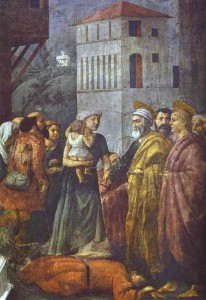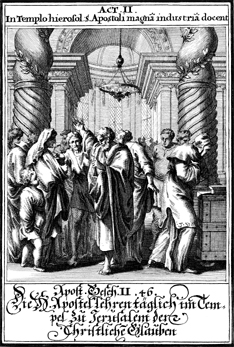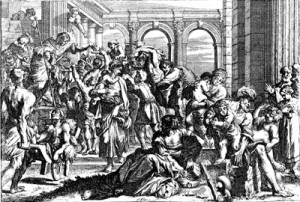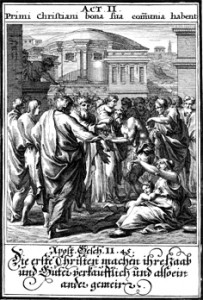Reflections on a Pauline Pilgrimage to Turkey [16]
“They devoted themselves to the apostles’ teaching and fellowship, to the breaking of bread and the prayers. Awe came upon everyone, because many wonders and signs were being done by the apostles. All who believed were together and had all things in common; they would sell their possessions and goods and distribute the proceeds to all, as any had need. Day by day, as they spent much time together in the temple, they broke bread at home and ate their food with glad and generous hearts, praising God and having the goodwill of all the people. And day by day the Lord added to their number those who were being saved.” [Acts 2:42-47]
[1] Fractio Panis [Breaking of Bread] in the Catacombs of Rome.. [2] Distribution of the Goods of the Community and the Death of Ananias, 1425.
Waiting at the airport of Istanbul for our return flight, we had much time to reflect on this trip. Recalling St Paul’s own life of conversion and his work of evangelization, we realized that the late Pope John Paul II had nailed it when he said that the goal of evangelization is ongoing conversion. We cannot convert anyone, not even ourselves. Only the Holy Spirit can change people’s hearts and minds. What we constantly need is an ongoing openness to the working of the Holy Spirit in each of our lives.
Removed by some two thousand years from the first Spirit-filled Christian community in Jerusalem, has the Church today so seriously departed from what living under the fire of the Holy Spirit is all about, that it is hardly recognizable in core and substance from its ancient origin? It is of course a caricature to suggest, as it is often done, that the Christian faith morphed into a different creature each time it reached a new territory. As it spread, so the caricature says, the fervent faith in Christ that burst forth on the Day of Pentecost in Jerusalem transformed into a philosophy in Athens, an institution in Rome, and a business up and down North America. Such a caricature highlights only degradation. Still, a caricature is just what it is – a flawed and exaggerated depiction which nevertheless embodies serious elements of truth for those who honestly care about the truth. And since quite a few of our fellow pilgrims repeatedly lamented the state of Christian evangelization in Turkey, we were compelled, as it were, to recall how the first Christian community lived after the first Pentecost and what they did by way of evangelisation.
From the report of St Luke in Acts 2:42-47, twelve elements characterize the first, freshly pentecosted, faith community:
- They devoted themselves to the apostles’ teaching;
- They stayed in close communion through fellowship;
- They broke bread together;
- They prayed together;
- Their souls had true fear and reverence for God;
- The apostles were able to work wonders and signs;
- They shared things in common;
- They sold their personal possessions for distribution, according to needs;
- They attended the temple daily;
- They partook of food with glad and generous hearts;
- They praised God; and
- They had favour with all the people.
Every one of these elements deserves serious unpacking in extended reflection, and we hope there may be opportunities to do so in the future. At this time, our thoughts proceed on to the fact that the Bible came into being as God revealed Godself through the lives of people of faith – real people in real time who sought to focus their lives upon the God of Jesus Christ. At the first Christian community in Jerusalem, the bottom line is that the first believers focused their lives on God as the only means of their own salvation and the only means to salvaging a lost world. They lived in close fellowship, a community of disciples living as a community of love, focused on God through the message of the Cross. Jesus is the One who was for a while made lower than the angels, and in the end to be raised and crowned above all [Hebrews 2:6-8; Ephesians 1:22; 1 Corinthians 15:27]. He, the “new man”, opens up a way of renewal and return to God for all the world. The early disciples had understood it. They lived the Way and the Message which must continue to be relevant to us in the twenty-first century.
[1] Worship Community in Acts 2, by Johann Christoph Weigel. [2] Believers Share Possessions in Acts 2. [3] Fellowship of Believers in Acts 2, by Johann Christoph Weigel.
Of great significance is how God revealed through St Luke’s writing that the first Christians “had favour with all the people” precisely because they were Christians by the way they lived in faith, hope and love.
- In real time daily existence, and not just in beautiful words that outsiders would laugh to scorn if they saw that the words rang empty, their lives manifested a true Christian community.
- There was true love, true discipline, true commitment.
- They neither displayed big banners, nor made mantras out of empty slogans.
- And here is the thing – “all the people” saw what a true Christian community was like and were attracted to it.
- St Luke went on to conclude this section of his report with this most encouraging remark: “And the Lord added to their number day by day those who were being saved” [Acts 2:42-47].
Gospel narratives on the life of Jesus consistently present us with the picture of Jesus inviting people to “come and see” [John 1:39] and “Go back and tell John what you have seen and heard: the blind receive their sight, the lame walk, lepers are cleansed, and the deaf hear, the dead are raised up, the poor have good news preached to them” [Luke 7:22-23]. He wants people to make up their own minds and to own their decisions. From Jesus, we learn that the Gospel spreads best, not through force, but through fascination. St Luke had learned that well.
In Acts, St Luke did not say Church-membership increased on account of active evangelization. What he did say was that the first pentecosted faithful in Jerusalem truly lived as Christians, by virtue of which they found favour with all people who were fascinated by what they saw. Christian faith spread in the first century neither by winning technical debates nor by preaching proudly about the resurrection of Christ, but because Christians lived in the love of Jesus Christ. People liked what they saw in the way the believers lived, not what they heard them preach! What St Luke did also say in the Gospel, as did the other two Synoptic Evangelists, was that, right after Peter has correctly professed Jesus to be the Christ at Caesarea Philippi, Jesus strictly charged the disciples not to tell any one about that truth. Why? Why would Jesus command of them, “Don’t tell anybody”? Jesus did not want them to go round telling other people who he really was – the Christ, the Son of the living God – because they themselves were not ready yet. They had not really taken on board the truth of Jesus’ real identity, let alone live it, never mind preaching it with any degree of conviction or authenticity. True enough, as Jesus turned his face towards Jerusalem, his journey towards the Holy Week would be riddled with what we now look back with the benefit of hind sight as “ridiculous” and most “unseemly” scenes of Peter telling the Lord never to enter into suffering and death, and the chosen Twelve jostling for positions, denying and betraying him, and going into hiding in his most trying hour on earth.
In all this, Biblical revelation highlights for us the crucial distinction between being and doing. If the gospel of Jesus Christ is really Good News for all of humanity, then the summons to believe is first and foremost a summons to allegiance to the Lordship of Christ in the way we live. This goes to the core of what it means to be Christians, to our being as Christians. It stands prior to everything else, certainly ahead of a headstrong, active, verbal work of evangelisation – of doing the work of converting the so-called “pagans”.
Today, the Catholic Church is abuzz with talks about the “New Evangelisation”, the subject of the next Synod of Bishops. What is it? Pope John Paul II once said that it means to “rekindle in ourselves the impetus of the Church’s beginnings. This will stir in the church a new sense of mission, which cannot be left to a group of specialists. It must involve the responsibility of all the People of God”. That of course is not new. The Second Vatican Council [1962-65] had clearly set down the priority for the church’s pastoral projects as a new proclamation of Jesus’ message. This priority stands at the root and basis of the vision of the early Church – the Kingdom of God – a reign of justice, forgiveness, peace and love. But the sad truth is that the Church seems unable to enflesh this vision at this point of her history. “Show” and “tell” do not match but are widely disproportionate. We say one thing; we do another. If we do not bring that vision of God’s Kingdom to life for ourselves, how can we bring it to life to everyone we meet? Repeatedly in a high-handed manner, officers vested with position and authority are quick to ex-communicate theologians and pastoral workers alike on alleged doctrinal grounds that are highly contentious and debatable, while dragging their feet on colossal scandals where the position, image, status and privileges of the members of the ordained might be affected. If the values of the Kingdom of God are not the basis for the Church’s life and all her pastoral activities, what have we got to convert others by?
And so, a plea to return to the Church’s beginning is legitimate. There, the New Testament clearly tells us, conversion is never primarily the adoption of a new set of ideas or principles. Rather, it is a process of joining a community with a view to establishing a personal relationship of commitment to the Risen Christ. This inauguration of an intimate relationship with Christ must be accompanied by formation and an appropriate spirituality. The first Christians met in private homes for their religious gatherings, and that constituted the most important factor in their evangelization. This led inevitably, where the commitment was genuine, to communicating the truth by witness, rather than by arguing about it.
What St Luke has given us is a challenging picture of what it means to be Christians and a Word-centered community framed in a real-life portrait of those who were the first to be baptized with the Holy Spirit. This was the original version – a truly awesome sight!
And that leaves us feeling very uneasy indeed. In the reality of today when the Church is in the grip of endless ecclesiastical crises, both universal and local, which leave Catholics world-wide shrouded in humiliation, it sounds exceedingly scandalous and presumptuous to speak of active evangelization when, in spirit and in truth, what the Church seriously needs is renewal and serious reformation.
Clearly, what the Church urgently needs at this time of her history is not more St Pauls and St Barnabases as some members of our pilgrimage group were suggesting, if we are thinking of them only as active pagan-converters. There is every danger, as we see it, of a serious forgetfulness of St Paul not only preaching the message of the Cross, but living it throughout his life as a disciple of Christ. Rather, what we need to do is to storm heavens’ gate and beg the Lord God to raise up prophets – as was done throughout the ages whenever the faith community was mired in crises – who would, in saintly weaknesses, preach by living the powerful message to repent and change, and to seriously renew and truthfully reform. We Christians must first return to the Cross of Christ in our own lives, before we could possibly know how to preach it well to those outside the church walls.
Our minds, quite spontaneously, recalled St Francis of Asissi, raised by God in the early thirteenth century to heal the corrosive corruption in the Church. Three centuries later, God raised the likes of St Cajetan who, together with three friends (one of whom would go on to become Pope Paul IV), would address the greatest need of the time, which was the reformation of a Church that was “sick in head and members.” They knew that the best road to reformation lay in reviving the spirit and zeal of the clergy, a point which the bishops at the Second Vatican Council would again stress: “The Council is fully aware that the desired renewal of the whole Church depends in great part upon a priestly ministry animated by the Spirit of Christ”. The Spirit spoke at Vatican II: the Church will not be renewed if the priestly ministry refuses to be renewed. So we are absolutely convinced, we can’t do it – we can’t renew and reform – except with and by the Holy Spirit.
In everything that we do, do not stifle the Spirit!
“Send forth your Spirit, O Lord, and renew the face of the earth” [Psalm 104:30].
Copyright © Dr. Jeffrey & Angie Goh, March 2012. All rights reserved.
You are most welcome to respond to this post. Email your comments to us at jeffangiegoh@gmail.com. You can also be dialogue partners in this Ephphatha Coffee-Corner Ministry by sending us questions for discussion.

![Fractio Panis [Breaking of Bread], in the Catacombs of Rome](http://www.jeffangiegoh.com/wp-content/uploads/2011/09/Fractio-Panis-Breaking-of-Bread-in-the-Catacombs-of-Rome.jpg)



